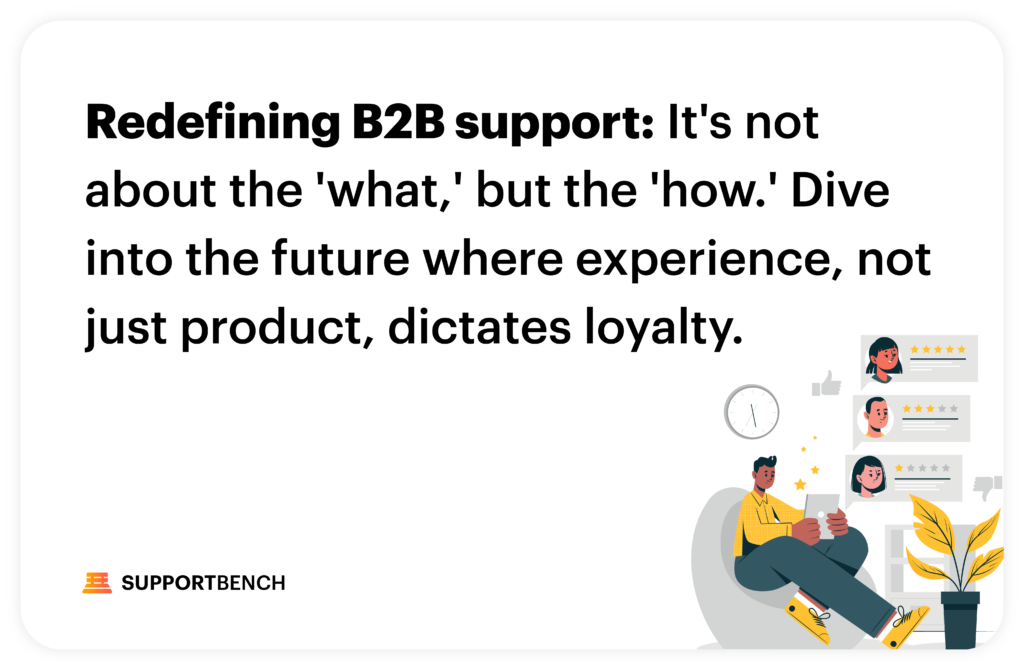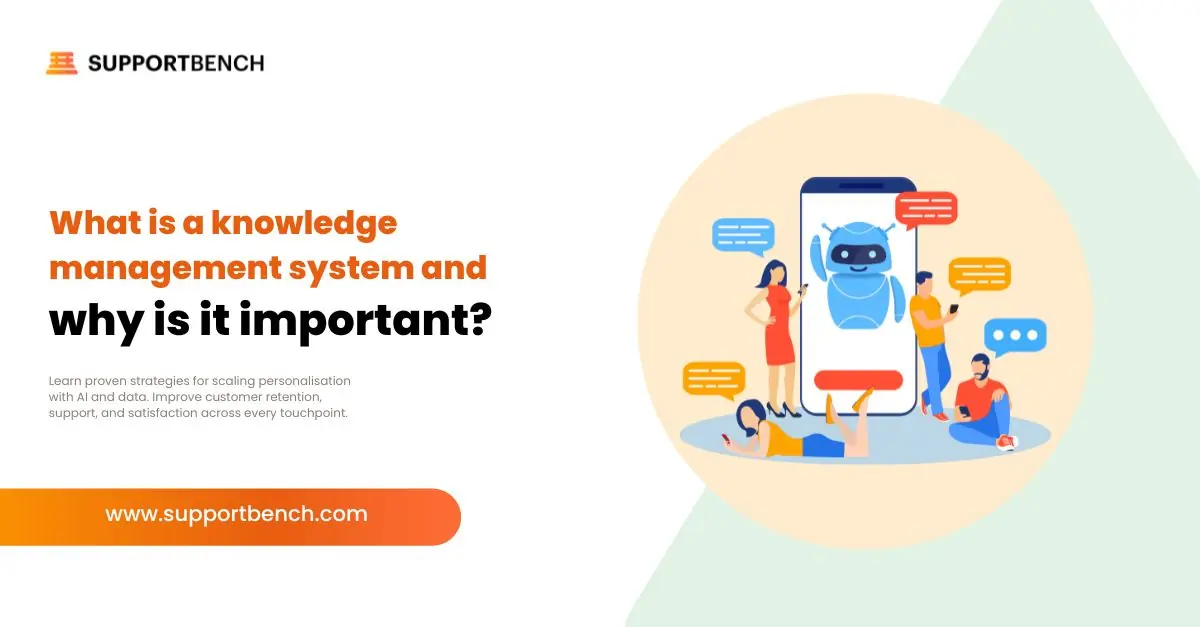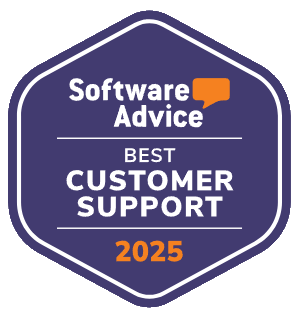In the ever-evolving world of customer experience (CX), change is the only constant. The expectations of customers are rapidly evolving, and businesses are in a race to keep up. As a company dedicated to revolutionizing enterprise support, Supportbench is always ahead of the curve. In this article, we delve into the 10 profound insights of leading CX experts on the future of support, and how YOU, especially in the B2B enterprise sector, can prepare for it.

1. “Customers don’t benchmark you on the ‘what,’ but the ‘how.’ They remember the experience, not just the product.” – Tiffani Bova
More than the product itself, the experience you provide around it becomes the defining factor for customer loyalty. So, it’s really not just about addressing their problems, but about how they feel during the resolution process. Quite literally, the tactile feel of a product or the efficiency of a service is secondary to the emotions and experiences they evoke. As we move into an era where product differentiation narrows, experience becomes the primary driver of loyalty.
Having a Support system with tailored and dynamic SLA’s is a great first step for achieving this level of customer satisfaction. With Dynamic SLAs, teams can adapt their responses based on specific case nuances, ensuring a consistent, high-quality experience. These customizable SLA’s allow you to customize your support based on the specific needs of each case, ensuring every customer feels valued.
This data will allow you to understand the customer’s emotional journey throughout their interaction with your brand. Where are the highs and lows? And then you can address the lows to enhance the overall experience. And of course, constantly engage with your customers to understand their experience and implement feedback where necessary.
2. “Data is the new oil. But data in its raw form is just noise. You need to refine it into actionable insights.” – Bernard Marr
While most businesses are collecting vast amounts of data, few are making meaningful use of it. The key is turning this data into actionable insights that can drive support strategies. And without the right Support tools and expertise to interpret this data, it remains unused potential.
Start by investing in premium analytics with tools that are specifically made for B2B Enterprise. These tools will provide clear insights from raw data help in strategic planning, specific to YOUR industry. These newer Support tools, like Supportbench, use AI-driven insights such as sentiment analysis and emotional scoring to fine-tune your support responses. Their AI capabilities provide a great example of data-driven optimization in action. You can then use this data to understand each customer’s preferences and customizing their experience, accordingly, making each interaction more meaningful and impactful.
3. “In the age of the customer, executives don’t decide how customer-centric their companies are, customers do.” – Kate Leggett
Companies no longer have the sole say in their branding. In the digital age, customer reviews, feedback, and social media sentiments shape a brand’s image. Now, customers have an unprecedented voice.
You can get ahead of this by implementing a Support solution with a robust feedback system like Supportbench. It has fully integrated support surveys, including custom surveys, NPS, and CES to always stay attuned to customer sentiments. Feedback systems like this allows your customer to voice their opinions without hurdles, giving you more insight into their expectations way in advance of an escalation. Proactive is always preferred over reactive.
4. “Technology and automation should serve as tools that embolden the human spirit, not replace it.” – Blake Morgan
While automation is pivotal in handling scale, the human touch remains irreplaceable in customer support, especially in emotionally charged situations.
While using AI, make sure you’re using a Support platform that allows for the perfect balance between chatbots and human connection. Absolutely use AI for routine queries and tasks but ensure humans handle complex or sensitive issues. And of course, ensure support staff are trained not just in product knowledge, but also in empathy and communication skills.
5. “Support in the future won’t be about the size of your team but the strength of your technology.” – Unknown
The focus is shifting from mere numbers to how well-integrated and advanced your support technologies are. As automation and AI become more advanced, a smaller but more skilled team, armed with powerful tools, will deliver superior support.
It’s integral to regularly evaluate the effectiveness of your support tools, ensuring they meet current requirements. And if needed, trade out your old solution that’s costly and not adding value for Support Platforms like Supportbench, with a comprehensive suite of features, AI-driven insights, customizable dashboards, and thereby setting the gold standard of B2B Support.
6. “The next frontier in CX is deep personalization. Customers expect solutions even before they recognize the problem.” – Shep Hyken
The future of customer support is not about flashy technologies but those that seamlessly integrate into user experiences, making processes smoother without users noticing. One big differentiator between Support platforms is, now newer platforms are almost entirely built to be proactive rather than the traditional reactive models of the past. Proactive support is the future and anticipating customer issues before they become apparent will set businesses apart.
You won’t know there is a problem until you conduct regular tech audits. If you regularly evaluate the collection of technologies you’re using, you can identify which ones are still relevant and efficient and which ones are cumbersome and ready for a replacement.
When you’re choosing your Support solution, opt for technologies that can be easily integrated into your current workflow without causing disruptions. Also, implement systems that can analyze customer health scores and trigger support interventions before a customer reaches out. Because you ALWAYS want to prioritize the user experience. Ensure any of your old tools or processes are not continuing to complicate or hinder your user’s journey.
7. “Knowledge management will be the game-changer in support. Empower your teams with the right information at the right time.” – Esteban Kolsky
As technology becomes more advanced, the human element of communication becomes even more crucial. The organizations that care for their customers will stand out. And of course, an informed support agent resolves issues faster and provides a superior customer experience.
Start by giving your team the tool they need to do their jobs at an optimal level. Invest in a robust KCS knowledge base system, ensuring that your team always has updated and relevant information at their fingertips. Using a premium Support platform with full AI integrations will help you to avoid canned or templated responses. Use systems newer systems like Supportbench to craft personalized messages tailored to the customer’s unique situation. And of course, regularly train support staff on the importance of empathy in communication. And encourage your team to practice active listening whereby they understand the problem fully before jumping to solutions.
8. “In an interconnected digital world, silos will be the downfall of any business.” – Jeanne Bliss
A company that doesn’t have its systems communicating is setting itself up for inefficiencies and customer dissatisfaction. Modern support isn’t just about answering questions but understanding and anticipating the unexpressed needs of the customers.
You can’t wait for customers to report issues. Instead, use a tool with optimum data analytics to identify potential problems and address them proactively. You can then synchronize data across platforms. For example, Supportbench’s Salesforce synchronization capability is a prime example of system integration. You have multi-departmental communication at the click of a button without issue or time-lapse. It’s integral to your company and department to look at customer support holistically. Not simply as an isolated department but as a key component of your entire business strategy. Newer Support Platforms like Supportbench allow for a 360-degree customer overview, facilitating this holistic approach.
In summary, with the landscape of CX changing, it’s crucial for B2B enterprises to understand and adapt to these shifts. By staying informed, investing in the right technology, and keeping the customer at the core of every strategy, support teams can and will become the heroes of their organizations. Companies can then enhance their support operations, ensuring they remain at the forefront of customer satisfaction. Platforms like Supportbench, with their holistic and forward-thinking approach, aren’t just tools, they are the embodiment of the future of Customer Support.















